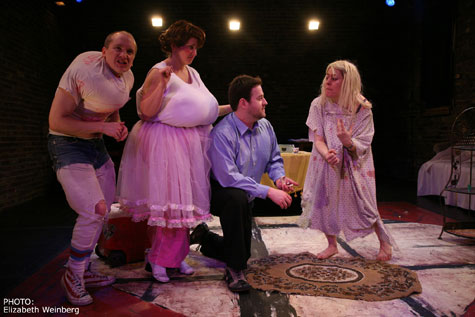Anya Singleton, The Other Side
Anya Singleton's first full-length album goes a long way towards fulfilling the promise of her earlier EP, Not Easy To Forget. The jazzy sound of that disc has evolved here into a more up-front soul sound with a bigger beat, epitomized by the insistent opening track, "Don't Tell Me." When I first played on the song it brought to mind the shock to the system I felt when I first heard Dana Glover's "Rain."
The slinky but unsentimental R&B thrum of "Small Disasters" and the airy "Simple" further show the subtle songwriting skills of Singleton and her two co-writers. In "Stop This Train," perhaps the best ballad on the disc, Singleton's phrasing resembles Bonnie Raitt's. By contrast, "Replaceable" is energetically pissed-off and punked-up, while "Nevermore" further establishes Singleton's strong persona: "No more lovin', rich boy, no, nevermore."
In the ruminative "Sandcastles" Singleton modulates her strong, rich voice down a notch, making me wish she'd actually take a few more chances with the fine vocal instrument she's been blessed with; there's a certain sameness to the quality of her vocals through much of the disc. When she opens up her belt in the anthemic closer, "The Other Side," one cheers her on and wants more.
But it's already clear that the indie route has given Singleton's talent some needed time to flower. I hate seeing undeveloped artists like Alicia Keys sprint to superstardom, never getting a chance to develop the way they might have, while taking up space in the public consciousness that more deserving artists ought to have.
Singleton could be one of those more deserving ones. I caught her live recently, singing a few songs with only Ann Klein on guitar backing her up. When she broke out "Don't Tell Me," the audience, which had come to see other performers, snapped right to attention.
Emory Joseph, Fennario: Songs by Jerry Garcia & Robert Hunter
Emory Joseph wants to spread the word of the greatness of the Jerry Garcia/Robert Hunter songwriting ouevre. It's a worthwhile effort. A gifted singer, Joseph assembled a collection of top musicians and recorded a dozen Garcia-Hunter tunes in five days in a New York City studio. The result should warm the hearts of Grateful Dead fans. Whether Dead-haters will give it a chance is, of course, another question.
"I think these two were as good a songwriting team as America has ever known," writes Joseph in the liner notes, "and have always wanted to share them with the non-Grateful Dead fans, who don't know what they're missing. The songs they wrote have beautiful melodies and words that fit in your life when you're 15, and yet still and again when you are 60." I've always felt the same way.
Take note of the subtext behind Joseph's notes: in certain ways that matter aesthetically to many music fans, the Grateful Dead, to put it bluntly, sucked. The music rambled, the songs went on forever, Garcia wasn't much of a singer and neither was Bob Weir. "Sugaree" may be one of the Dead's greatest hits, but Emory doesn't help his cause by opening the CD with a nearly eight-minute (albeit soulful) version of it.
Listen to the whole disc, though, and you'll appreciate the youthful bounce Joseph applies to many of these hoary Americana numbers. The Dead's aggravating tendency to go on and on is somewhat tempered, although even the rocker "Loose Lucy" is scattered over five and a half minutes. The result: Joseph succeeds in putting across the material with obvious love for it, while using his wide-ranging musical sensibilities to get at the essence of the songs.
Two of my favorites are two of the least stretched out: the dark, slinky-funk version of "New Speedway Boogie," and the lovely "Loser." Other highlights include "It Must Have Been the Roses," on which the versatile-voiced Joseph warbles like John Denver, and "Brown-Eyed Women," which features a guest turn from David Grisman on mandolin paired with beautiful organ work by Jon Carroll that's reminiscent of the E Street Band's Danny Federici (RIP). Others work less well; despite excellent Buckley-esque vocals, "Black Peter" comes across as a shuffle to nowhere, and intentionally corpse-like singing don't do much for "Mission in the Rain." But despite my nitpicks, I do believe this disc is going to become part of my permanent collection.
Parlour Steps, Ambiguoso
This is smart, playful rock out of Vancouver, fractionally reminiscent of XTC. Songwriter Caleb Stull sings in a kind of moan, sometimes doubled by bassist Julie Bavalis singing in a sigh. This isn't super-musical, but with subtly layered guitars and thumping beats the overall sound is of a mostly friendly, but also skewed and thoughtful pop.
Some of the best moments come in the vocal-instrumental break sections, as in the energetic "World As Large" and the emotion-soaked "Gargoyles Passion." Desperation fuels the intense "Thieves of Memory," while stark banjo-like sounds, keyboards, saxes, and accordion (courtesy of NYC's own Mark Berube) show up often enough to add undercurrents of rootsiness and old-world charm.
There's little rootsy or charming about the angular, often angsty lyrics, though. "Doubt is a higher function / It's hard work believing in nothing." Testify, brother Stull.
Kalliopi, Around the World
This disc was a nice surprise in a humble package. Kalliopi is a Greek singer-songwriter based in London. Her three-song CD single pleasantly combines lo-fi guitars and drums with lush, crystalline vocals. Unpretentiously catchy songwriting and passionate delivery make up for the somewhat muted production. The title track rocks hard, reminding me of Elastica with a touch of Alanis Morrisette. "Naked" is a mid-tempo pop-rocker with ululating background vocals that hint at Eastern Europe or the Middle East, a suggestion that gets fuller blown in the final track, the moody and lovely "Fire and Sea."
